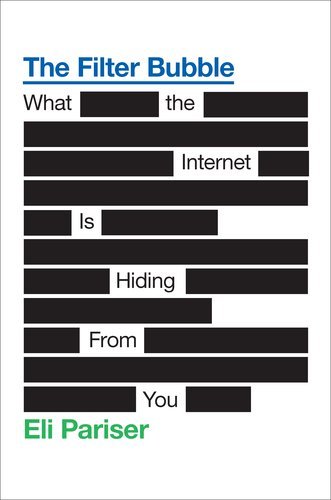 In my latest weekly Forbes column is entitled “The Internet Isn’t Killing Our Culture or Democracy” and it’s a short review of the new book, The Filter Bubble: What the Internet is Hiding from You, by MoveOn.org board president Eli Pariser. As I note in my essay, Pariser’s book covers some very familiar ground already plowed by others in the burgeoning Internet pessimism movement:
In my latest weekly Forbes column is entitled “The Internet Isn’t Killing Our Culture or Democracy” and it’s a short review of the new book, The Filter Bubble: What the Internet is Hiding from You, by MoveOn.org board president Eli Pariser. As I note in my essay, Pariser’s book covers some very familiar ground already plowed by others in the burgeoning Internet pessimism movement:
[The Filter Bubble] restates a thesis developed a decade ago in both Cass Sunstein’s Republic.com and Andrew L. Shapiro’s The Control Revolution, that increased personalization is breeding a dangerous new creature—Anti-Democratic Man. “Democracy requires citizens to see things from one another’s point of view,” Pariser notes, “but instead we’re more and more enclosed in our own bubbles.” Pariser worries that personalized digital “filters” like Facebook, Google, Twitter, Pandora, and Netflix are narrowing our horizons about news and culture and leaving “less room for the chance encounters that bring insights and learning.” “Technology designed to give us more control over our lives is actually taking control away,” he fears.
Pariser joins a growing brigade of Internet pessimists. Almost every year for the past decade a new book has been published warning that the Internet is making us stupid, debasing our culture, or destroying social interaction. Many of these Net pessimists—whose ranks include Andrew Keen (The Cult of the Amateur), Lee Siegel (Against the Machine), Jaron Lanier (You Are Not a Gadget) and Nicholas Carr (The Shallows)—lament the rise of “The Daily Me,” or the rise of hyper-personalized news, culture, and information. They claim increased information and media customization will lead to close-mindedness, corporate brainwashing, an online echo-chamber, or even the death of deliberative democracy.
If you’ve read anything I’ve written on this topic in recent years, you will not be surprised to hear that I disagree with Pariser and these other Net pessimists when it comes to fears about hyper-personalization and user customization. As I noted in my recent book chapter, “ The Case for Internet Optimism, Part 1 – Saving the Net From Its Detractors“:
Their claim that the “Daily Me” and information specialization will lead to a variety of ills is also somewhat overblown. It’s particularly hard to accept Sunstein and Carr’s claims that increased personalization is breeding “extremism,” “fanaticism” and “radicalization.” A recent study by Matthew Gentzkow and Jesse M. Shapiro of the University of Chicago Booth School of Business lent credibility to this, finding “no evidence that the Internet is becoming more segregated over time” or leading to increased polarization as Sunstein and other pessimists fear. Instead, their findings show that the Net has encouraged more ideological integration and is actually driving us to experience new, unanticipated viewpoints.
While it’s true the Internet has given some extremists a new soapbox to stand on and spew their hatred and stupidity, the fact is that such voices and viewpoints have always existed. The difference today is that the Internet and digital platforms have given us a platform to counter such societal extremism. As the old saying goes, the answer to bad speech is more speech—not a crackdown on the underlying technologies used to convey speech. It should not be forgotten that, throughout history, most extremist, totalitarian movements rose to power by taking over the scarce, centralized media platforms that existed in their countries. The decentralization of media makes such a take-over far less plausible to imagine.
The good ol’ days weren’t so great. By most measures we’re more informed and interactive than ever before. Here’s a simple test that works particularly well for anyone over the age of 35: Did you have more serendipitous encounters with alternative viewpoints before or after the rise of the Internet?
Most of us had very limited interactions with people and ideas beyond our communities before the Net. Even as modern technology has allowed increased user-customization, it has also opened our eyes to a world of new ideas, perspectives, and culture. The Digital Age is more personalized but also more participatory. It promotes greater cultural heterogeneity and gives everyone a better chance to be heard.
The problem with this “eat your greens” approach—besides being somewhat elitist—is that it just isn’t practical. People will continue to want, and get, a more personalized web experience. But that doesn’t mean deliberative democracy is dying. As the existence of MoveOn.org and countless groups like it proves, vigorous debate and political activism have never been stronger.

 The Technology Liberation Front is the tech policy blog dedicated to keeping politicians' hands off the 'net and everything else related to technology.
The Technology Liberation Front is the tech policy blog dedicated to keeping politicians' hands off the 'net and everything else related to technology.